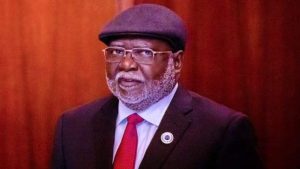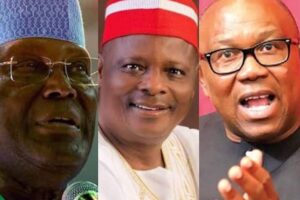Group Writes CJN, Warns Him Against Compromise Of 2023 Election Petitions
Group Writes CJN, Warns Him Against Compromise Of 2023 Election Petitions
A group under the aegis of Access to Justice has written to the Chief Justice of Nigeria (CJN), Justice Olukayode Ariwoola, saying Nigeria’s judicial accountability and transparency standards do not guarantee that the judiciary will live up to the expectations of Nigerians in the delivery of electoral justice.
The group in an open letter signed by its Convener, Joseph Otteh, lamented that there is wide public perception (including those of highly respected jurists) that election dispute resolutions in Nigeria create avenues for money laundering.
Access to Justice recalled that the Independent Corrupt Practices and Other Related Offences Commission (ICPC), in its recent study said over N9 billion was offered to judges (most of whom handled election petitions) within a space of three years, but in spite of the “unacceptably high incidence of corruption” associated with different cycles of electoral adjudication in Nigeria, the judiciary has not taken extra steps to strengthen the ethical framework for electoral dispute adjudication.
The group said, “The NJC’s (National Judicial Council) own disciplinary records, as well as those of anti-corruption agencies bear out the extraordinary incidence of corruption associated with the determination of electoral disputes.
“From publicly available records, more than fifteen (15) Judges and Justices of courts have been arrested/investigated, convicted or sanctioned for election determination misconduct, many of which relate to corruption, and Your Lordship would of course note the embarrassment which such scandals inflict on the Judiciary itself.”
The group stated that for the most part, electoral disputes’ adjudicators carry out their work honourably, ethically and diligently, but past experiences showed that a number of judges exploited and still exploit the electoral judicial process for personal gain, and in so doing, pervert electoral justice and legitimize the subversion of democratic choices made by voters.
The group further noted that it observed that part of the problem is that the NJC’s accountability system for Judges is “generally weak and outdated, and does not meet the exigencies of safeguarding the integrity of the judiciary at periods like this”.

“Neither the NJC’s Code of Judicial Conduct (CJC) nor the Judicial Discipline Regulations, as experience has shown, have effectively deterred Judges from engaging in corrupt practices because they miss a vital link to fighting corruption, which is ‘detecting’ it,” it added.
It continued, “They also do not promote the role of the public in fighting judicial misconduct. The NJC’s overall strategy for fighting judicial corruption and the policies in place for accomplishing that mission are, therefore, not creative and good accelerators for winning the struggle, much less for maintaining the integrity of the electoral justice delivery process.
“We are concerned that the Judiciary has not taken extra steps to plug the gaps and tighten the spaces that facilitate misconduct by election petition Judges/Justices. Judicial oversight authorities have not strengthened their monitoring and oversight mechanisms or supplemented available judicial safeguards with new effective tools/policies even at this critical time when so much is hanging on the Judiciary for resolution.
“Given escalating tensions and the fragility of Nigeria’s political atmosphere at this time, some Judges may, by their misconduct, place Nigeria’s democracy in more portentous danger if the NJC is unable to exercise better control of their conduct in adjudicating electoral cases.
“Perverting the electoral adjudication process has grave consequences, not only for the democratic system but also for the constitutional role reserved for courts in preserving it.
“The Judiciary’s failure or inability to ascertain and vindicate the democratic choices made by electors can destabilize political society. It is of utmost importance, therefore, that the Judiciary’s supervisory and restorative powers in election cases must not be compromised.
“Like never before, the last elections have put Nigeria’s future on edge, with political tensions now at boiling point. If the Judiciary malfunctions in any serious way, the consequences will predictably be dire and unmanageable for Nigeria as a democratic state.”








Add Comment